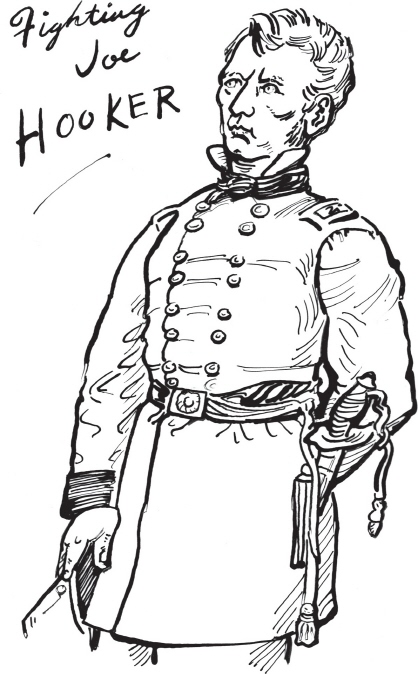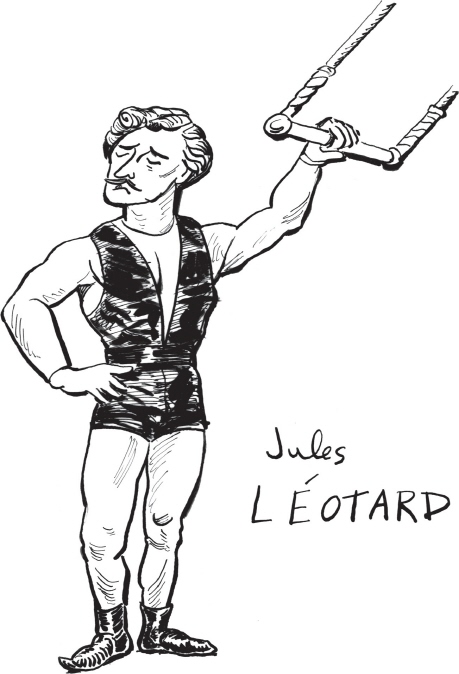Anonyponymous (5 page)
Authors: John Bemelmans Marciano

Fighting Joe Hooker was a hard-living leader beloved by his men. A veteran of the Seminole wars and the invasion of Mexico, he had trouble adjusting to civilian life, where his drinking and gambling wasn’t quite so well tolerated as around the battle camp, and so was happy when the Civil War came along and offered him a chance to get back into the fighting game.
At the disaster of Antietam, Hooker distinguished himself by fighting the great Confederate general Stonewall Jackson to a standstill. Then came the further disaster of Fredericksburg, during which Union commander General Ambrose Burnside (see
sideburns
) ordered more than a dozen assaults by Hooker’s brigade over the protests of Fighting Joe, who correctly recognized their inferior position. His troops fell in droves, and the never-shy Hooker called Burnside a “wretch” and his battle plan “preposterous,” helping to get the general fired and himself promoted.
Having suffered a succession of lamblike commanders, Fighting Joe was precisely the kind of man Lincoln was looking for. Upon Hooker’s appointment to the overall command of the Army of the Potomac, Union soldiers rejoiced. “May God have mercy on General Lee,” Hooker said, “for I will have none.” His modest plan for the spring campaign was to engage and defeat Lee’s army and straightaway march on the Confederate capital of Richmond.

To map out his success in a pleasant atmosphere, Hooker surrounded himself with cronies and his army headquarters became something between a “bar-room and brothel.” His soldiers, meanwhile, ran roughshod over every corner of Washington, D.C., in search of paid sex. It became such a problem for military police that Hooker ordered that prostitutes be restricted to an area of the city known as Murder Bay, where assumedly the local populace wasn’t so prudish. This red-light district became known as Hooker’s Division, and the word
hooker
, meaning prostitute (already a regional slang term), gained widespread currency.
As for how things went against General Lee: not well. The showdown between Hooker and the Gray Ghost at Chancellorsville became known as Lee’s Perfect Battle, if that gives you some idea of the outcome. After the defeat Hooker, like Burnside, offered his resignation to Lincoln with the expectation that it wouldn’t be accepted, and he, like Burnside, received an unpleasant surprise from Honest Abe.
hoo·li·gan
n. A ruffian.
A fixture around Southwark, a nineteenth-century Irish slum in London, Patrick Hooligan worked as a bouncer at neighborhood pubs. He was better known, however, as the mentor of young hoodlums, whom he instructed in the arts of robbery and assault. One day, old Paddy got into an argument with a bobby, killed him, and dumped the body in a garbage cart. Hooligan was nabbed and died soon after in prison, but his life’s work was carried on by numerous London street gangs who bore his name and by soccer fans in stadiums across the land.
ja·cuz·zi
n. A whirlpool bath. v. To take one.
In the beginning, Candido Jacuzzi just wanted to help his son. The poor boy suffered from severe rheumatoid arthritis and his only relief came from the hydrotherapy treatments he received at the hospital. In order to give his child round-the-clock whirlpool access, Jacuzzi developed a portable pump that could be placed into a bathtub. Being an engineer, he had the skills to do this; as co-owner of a Northern California manufacturing company, he had the capability. He and his six older brothers had started making aircraft equipment in 1915, but with the J-300 the Jacuzzis entered a new field.
Roy Jacuzzi had more vision than his uncle Candido and better marketing acumen. He smelled opportunity for the J-300 in late 1960s California and repackaged it as a stand-alone product he dubbed the Roman Bath. Sales were so good that a larger model, the Adonis, was introduced in 1970, followed by Jacuzzi’s great breakthrough, the multi-person Gemini unit, available in a wide array of colors and swanky styles.
Swinging changed forever.
jan·i·tor
n. A man who pushes a cart of cleaning supplies
down the halls of an institutional building.
Pity poor Janus, once the mightiest Roman deity of all. He was the father of the gods—until his worshippers fell all over themselves for the flashier, sexier Greek pantheon and left Janus to be god of doors. (Those who attended to him—that is, doorkeepers—were called janitors.) Janus was well suited to his task, at least, having a face on both the front and back of his head. Romans believed this also allowed the god to see into both the future and the past, and for this reason Janus presided over the month that opened and closed each year.
January was a late entry to the Roman calendar, added at the same time as February. For centuries there were only ten months, winter being deemed unworthy of month-hood since nothing grew then. With the exception of February, the first four of the original months were, like January, named after deities: March for Mars, April for Apru (an Etruscan borrowing of Aphrodite), May for Maia (a Roman earth goddess), and June for Juno ( Jupiter’s wife). The rest of the months were simply numbered, which—once the first of January was set as the official start to the year—created the odd situation of the ninth through twelfth months being named for the Latin numbers seven through ten, that is,
Septem
ber,
Octo
ber,
Novem
ber,
Decem
ber. And we would still have the summer months of
Quint
ilis and
Sext
ilis if not for a couple of emperors named Julius Caesar and Caesar Augustus.

The Romans didn’t end with months when it came to honoring their deities. They believed that the planets represented gods who kept a rotating watch over the mortal coil as they crossed the sky. When the Romans adopted the seven-day week, they named the days after whichever god had the first shift of the morning. Conveniently, there were exactly seven planets according to ancient astronomy: Sol (the sun), Luna (the moon), Mars, Mercury, Jove (another name for Jupiter), Venus (or Venere), and Saturn.
A person’s temperament was believed to be shaped by whichever god ruled over his or her birth, making you either solar, lunar, martial, mercurial, jovial, venereal, or saturnine. The latter four adjectives remain consistent with their Latin meaning, with the exception of venereal, which, before it became inextricably linked with STDs, meant “inclined to be lascivious; addicted to venery or lust,” which is pretty much how it got to be inextricably linked with STDs in the first place.
jum·bo
adj. Enormous; huge; really, really big.
One fine morning in 1861, a little elephant awoke expecting to spend another day munching grass on the sunny savannah. Alas, he never would again. Captured by exotic animal traders, the unwitting pachyderm was shipped off to the Jardin des Plantes in Paris, where he spent the unhappy remainder of his calfhood. Skinny, sickly, and only four feet tall, he was unceremoniously swapped to the London Zoo for a rhinoceros.
Named Jumbo by his new zookeeper—it kind of sounded African—the elephant began to grow. And how could he not? His daily menu included two hundred pounds of hay, two bushels of oats, ten to fifteen loaves of bread, a barrel of potatoes ( Jumbo did not bant), a bunch of onions, and many, many barrels of water, with an additional one of whiskey or ale on occasion, for his health. Who says you eat better in Paris than in London?
Jumbo, now enormous, became a hit with the crowds. He’d snatch up coins and peanuts in his trunk and give rides to the kiddies for pocket change, including a couple of young tykes named Winnie Churchill and Teddy Roosevelt. And then a man took a ride on his back who knew he could charge a whole lot more than a few measly shillings for the Jumbo experience.
In 1881, Phineas T. Barnum expanded his circus from two to an unprecedented three rings. Needing a star, P. T. went out and bought seven tons of one. The outrage across Britannia was immediate and intense. Schoolchildren wrote letters of protest to Queen Victoria, who herself was outraged but couldn’t do anything to reverse the ten-thousand-dollar sale. The London
Daily Telegraph
bemoaned how poor Jumbo would have no more shady walks in the park and instead be forced to “amuse the Yankee mob.” The controversy resulted in a publicity bonanza for Barnum, who billed Jumbo as the largest elephant in the world. America was seized by Jumbomania. Every product imaginable was called Jumbo. There were Jumbo cigars, Jumbo trading cards, Jumbo fans—if something was big, it was Jumbo-sized! The new attraction sold more than a million dollars in tickets for Barnum’s Greatest Show on Earth in the first year alone.
For Jumbo, stardom wasn’t that great. In a self-destructive burst reminiscent of so many later celebrities, Jumbo ran wild one day in Canada and was killed by a train. Some say he was drunk, others that he was in a blind rage, while Barnum, ever the master of spin, claimed Jumbo had been struck down while bravely rescuing a baby elephant, pushing the little fellow out of the way of the locomotive at the last instant.

le·o·tard
n. A snugly fitting, stretchable one-piece garment
worn by dancers, gymnasts, and 1980s exercise queens.
When Jumbo arrived in Paris, there was another kind of circus phenomenon underway. Jules Léotard, the son of a gymnasium owner, was a novice acrobat when he hit upon a brilliant idea: how about, instead of doing his routine on fixed bars, he did it on bars that swung? On November 12, 1859, at the tender age of twenty-one, Léotard made his public debut at the Cirque-Napoleon in Paris, and in a single performance created an art form. As if by magic he passed from one bar to the other, and even executed midair somersaults between them. With his lady-killing looks and birdlike abilities, Léotard became an international superstar, inspiring a Jumbo-like assortment of merchandise as well as the 1867 song “The Daring Young Man on the Flying Trapeze.” For his shows, Léotard redesigned the standard acrobat’s maillot into a flesh-hugging one-piece that both allowed fluid motion and showed off his show-offable muscles. It became known as the leotard and quickly found use in other arenas, such as the ballet studios of Paris.
All this, and poor Jules died at thirty-one.
lynch
v. To execute, esp. by hanging, without due process.
“If you were a settler there, and had no other law to defend you, you would be glad of the protection of Judge Lynch,” Sir Charles Lyell reported in his 1849 book
A Second Visit
to the United States of North America
. The Judge Lynch in question was a mythical figure on the frontier, the authority invoked in the meting out of justice where there was no authority, at least none that those doing the meting desired to consult.
The “Lynch law” brand of vigilantism justice was seen by many nineteenth-century folk as a positively good thing. In the early 1800s an old Virginia farmer named William Lynch took credit for having assembled the original Lynch men back in Revolutionary days; a 1780 compact later turned up explaining why. Citing bands of lawless malefactors who committed horse stealing, counterfeiting, and “other species of villainy,” Lynch and his fellow subscribers to the pact promised that “if they will not desist from their evil practices we will inflict such corporeal punishment on him or them, as to us shall seem adequate.” No bothersome interference from courts or judges needed.